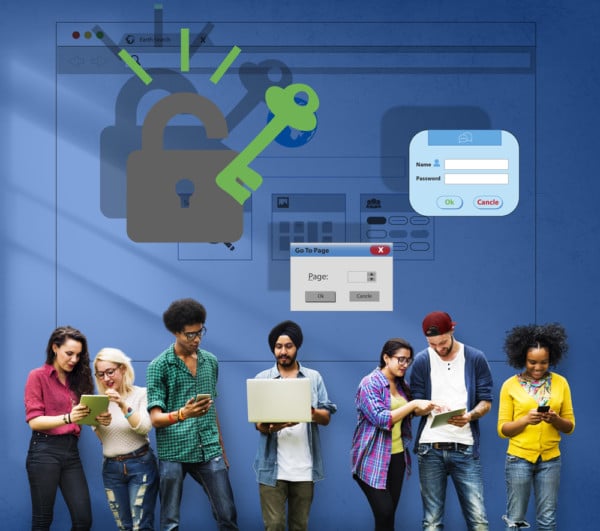8 Cyber Security Tips for College Students

The last 15 years brought a huge leap forward in technology; smart phones, tablets, wearables and smart watches, the very idea of mobile technology was science fiction in 2001. In 2016 we are more connected than ever before. When you add in the evolution of the internet, we have access to more information than ever before.
Think about it…the internet touches almost all parts of daily life. Along with the upside of having the world at your fingertips, comes a downside – cyber (or online) crime.
October is National Cyber Security Awareness Month. There are a lot of cyber security threats out there, from (somewhat) harmless hacks to more serious data security crimes that can literally ruin your life.
Here are 8 cyber security tips to help you avoid becoming a victim of cybercrime.

- Keep it close – Sharing workspace with a couple of dozen other students, or sharing communal areas of your campus with a couple of hundred means your devices can be accessed by others. Think of campus like any other public place – an airport or coffee shop for example. If you have a phone or tablet with you, keep it close. Don’t leave it on a desk or out of your sight. At the very least set a password-protected lock screen, and don’t share the pass code with the world!
- Not your dog’s/kid’s name or birthday – Speaking of passwords and pass codes, don’t use obvious choices; password theft is a huge issue! Don’t pick a combination of your birth year/day/month for your phone or tablet pass code. When it comes to online accounts, the best passwords are at least 8 characters long and include a combination of upper/lower case letters, numbers and symbols. Also, it’s a good idea to use different passwords for different sites so if one site is compromised, they won’t all need to be replaced. Consider investing in a password manager; a tool that creates complicated, lengthy passwords for your online accounts, without you having to remember them.
- Do the Two-Step – If possible, only use websites (where you store personal info) that require a two-step authentication process, meaning something in addition to a password. Watch this video from http://www.staysafeonline.org to see how doing the two-step can protect your digital life.
- Don’t Go Phishing – People continue to come up with scams designed to trick you out of your hard earned cash or compromise your data. NEVER share sensitive information such as your social security number in an email or phone call. Reputable companies like banks won’t ask for information that way. When in doubt, call the bank or credit card company, just don’t use the number referenced in the suspicious email or phone call. Find it yourself.
- Think. Connect.™ – This is a public awareness effort to increase the understanding of cyber threats and empower us all to be safer and more secure online. Before you click on a link, open an email you’re not sure about, or access bank or credit card accounts through an unsecured public WiFi network (like at a coffee shop)… STOP: make sure security measures are in place. Look for websites that start with https…that “s” means secure. THINK: about the consequences of your online actions. CONNECT: and enjoy the internet.[1]
- Back Up People! – Creating back-ups of important documents is important because of the growing risk of “ransomware” infections.[2] Ransomware works by letting someone remotely lock your computer and hold it ransom until you pay the hacker. Make sure you regularly back-up your stuff; use a thumb drive or external hard drive, and a cloud-based account.
- Don’t Over Share – When it comes to Facebook, Twitter, Instagram, and other social media sites – think twice before you post. Social networking sites, blogs, personal web pages are great places for people to discover your personal information – and once you post something, you can’t take it back! Think about it this way – Only share information you’d be willing to put on a billboard on the side of the road!

Credit: SukanPhoto/Shutterstock (adapted) - Stay Up-to-Date[3]
- Turn on auto updates for all your devices’ operating systems, antivirus software and apps. Having the latest versions is your best defense against viruses, malware and other threats. If you don’t want to auto update, install updates when you’re notified they’re available.
- For mobile devices, remember to sync every week so you get all available updates.
- USBs and other external devices can be infected by viruses and malware too. Use your security software to scan them when you plug them in.
- Shut down/restart your computer once a week.This helps make sure software and security updates are properly installed to protect your computer and keep it running smoothly.
For more tips about cyber security and how to stay safe online, visit http://www.stopthinkconnect.org or download their Basic Tips and Advice PDF.
[1] https://stopthinkconnect.org/resources/preview/tip-sheet-basic-tips-and-advice
[2] https://www.wired.com/2015/09/hacker-lexicon-guide-ransomware-scary-hack-thats-rise/
[3] https://staysafeonline.org/stay-safe-online/keep-a-clean-machine/malware-and-botnets